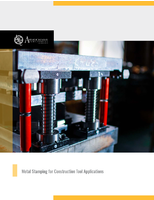Journalist discusses Chinese manufacturing.
Press Release Summary:
Broadcast on weekly radio program of NAM, Atlantic Monthly journalist, James Fallows, discusses his July/August Atlantic cover story, "China Makes, the World Takes". Fallows states that U.S-Chinese economic relationships have benefited both countries, but China will continue to put pressure on U.S. manufacturing jobs. China's goals include moving up manufacturing's value curve to more profitable stages of production, so U.S. policy should focus on ways to stay ahead.
Original Press Release:
Atlantic's Fallows Sees China as Posing Economic Benefit, Challenges to U.S.
Journalist Discusses Chinese Manufacturing on "America's Business with Mike Hambrick"
WASHINGTON, D.C., August 18, 2007 - U.S.-Chinese economic relationships have largely benefited both countries, but China will continue to put pressure on U.S. manufacturing jobs, Atlantic Monthly journalist James Fallows says this week on "America's Business with Mike Hambrick."
In far-reaching interview, Fallows discussed his July/August Atlantic cover story, "China Makes, the World Takes," on the rise Chinese manufacturing. The interview is the first of two parts to be broadcast on the weekly radio program of the National Association of Manufacturers (NAM).
China does not pose the same sort of economic challenge as Japan did in the 1980s, with large exporting firms competing directly with U.S. companies, Fallows said. At the same time, China can be expected to take more low-wage manufacturing jobs, he said.
"Where you have an economy where a good wage for people is $100 a month and they can have advanced production equipment, there is not a way in the long run that the U.S. will be able to have those manufacturing jobs in the U.S., rather than China," Fallows said, speaking from Shanghai.
China's goals also include moving up manufacturing's value curve to the more profitable stages of production, Fallow argued. The United States' ability to influence Chinese behavior is limited, he said, and so U.S. policy should focus on ways to "stay ahead."
"Obviously in the long run, China would like to move up both sides of that curve and have more of the higher value jobs in design and in branding and all the rest. I think that the U.S. responsibility at that point is to keep ahead of that process," Fallows said. "The Chinese are doing what their national interest would indicate and the U.S. should do what its national interest would indicate too, which is to find ways to stay ahead of them in that effort."
"America's Business with Mike Hambrick" appears weekly on more than 70 broadcast outlets nationwide. A downloadable sound file and transcript of this week's interview is available on the program's blog, americasbusinessblog.org.
The National Association of Manufacturers is the nation's largest industrial trade association, representing small and large manufacturers in every industrial sector and in all 50 states. Headquartered in Washington, D.C., the NAM has 11 additional offices across the country. Visit the NAM's award-winning web site at www.nam.org for more information about manufacturing and the economy.
CONTACTS:
KAT SNODGRASS (202) 637-3094; MIKE HAMBRICK (202) 637-3093




